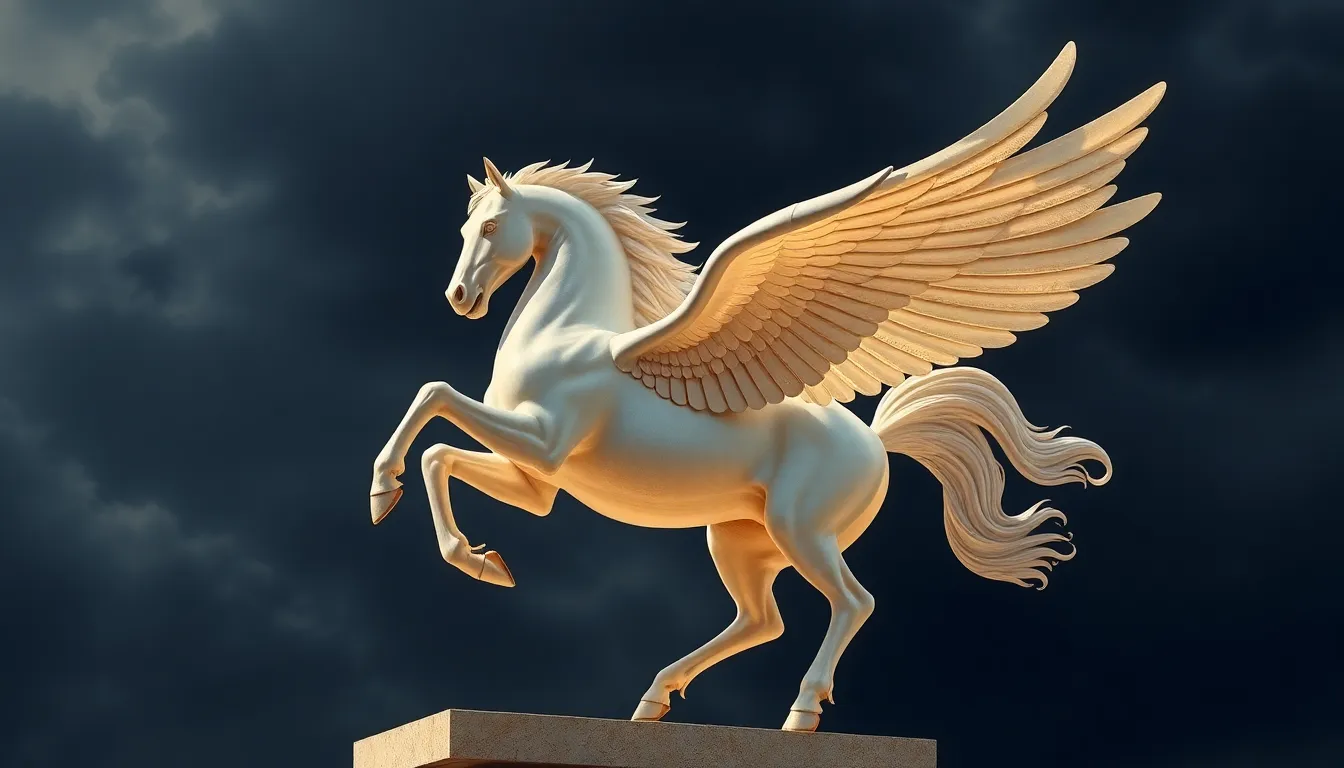The Legacy of Pegasus: How the Winged Horse Continues to Inspire
I. Introduction
Pegasus, the majestic winged horse of Greek mythology, stands as a powerful symbol of inspiration and creativity. Born from the blood of the Gorgon Medusa, Pegasus has captivated the imaginations of countless generations, embodying the ideals of beauty, freedom, and artistic expression. This article aims to explore the enduring legacy of Pegasus, examining its origins, representations in art and literature, and its role as a symbol of aspiration that continues to resonate in modern culture.
II. Historical Context: The Origins of Pegasus
The story of Pegasus begins in ancient Greek mythology, where he is often depicted as a divine creature associated with the Muses, the goddesses of the arts. According to myth, Pegasus was born when the hero Perseus beheaded Medusa, and his blood mingled with the sea, giving rise to the winged horse.
Key myths involving Pegasus include:
- Bellerophon and the Chimera: Bellerophon, a hero who sought to defeat the monstrous Chimera, was given Pegasus to aid him in his quest. Together, they epitomized the triumph of good over evil.
- Pegasus and the Muses: Pegasus is often linked to the Muses, as he is said to have created the spring of Hippocrene on Mount Helicon by striking the ground with his hoof, inspiring poets and artists alike.
In ancient times, Pegasus was interpreted as a symbol of divine inspiration, a creature that bridged the human and the celestial. His image appeared in various forms of ancient art, underscoring his significance in the cultural psyche of the Greeks.
III. Pegasus in Art and Literature
Pegasus has been a prominent figure in classical art, often depicted in sculptures, pottery, and paintings. Artists such as Jacques-Louis David and Gustave Moreau have portrayed this iconic creature, emphasizing its grace and power.
Iconic literary works featuring Pegasus include:
- Ovid’s “Metamorphoses”: Pegasus is celebrated as a symbol of poetic inspiration, showcasing the connection between the divine and the creative process.
- Shakespeare’s “A Midsummer Night’s Dream”: The character of Puck references Pegasus, highlighting the horse’s role in the world of dreams and fantasies.
In contemporary literature, Pegasus continues to inspire authors and poets. Modern adaptations often reinterpret the myth, exploring themes of freedom and the human condition. Books such as “Pegasus” by Kate O’Hearn and “The Last Unicorn” by Peter S. Beagle feature Pegasus in fantastical narratives, showcasing the creature’s versatility and relevance.
IV. Pegasus as a Symbol of Inspiration
Pegasus is deeply associated with the Muses, the goddesses of the arts, symbolizing creativity and inspiration. The winged horse serves as a reminder that art and imagination can elevate the human experience and transcend the mundane.
The use of Pegasus in motivational contexts is prevalent:
- In personal development, Pegasus symbolizes the pursuit of dreams, encouraging individuals to rise above challenges and express their true potential.
- The imagery of Pegasus is often used in workshops and seminars focused on creativity, helping participants break free from their limitations.
Pegasus embodies the human spirit’s quest for greatness, representing the belief that with inspiration, we can reach new heights and fulfill our aspirations.
V. Pegasus in Popular Culture
Pegasus has made a significant impact on popular culture, appearing in various forms of media. In film and television, Pegasus can be seen in:
- “Clash of the Titans”: This classic film features Pegasus as a loyal companion to Perseus, showcasing the creature’s heroic nature.
- Disney’s “Hercules”: In this animated film, Pegasus is depicted as a playful and courageous character, appealing to a younger audience.
In video games and comics, Pegasus often appears as a powerful ally or a majestic symbol. Titles such as “Final Fantasy” and “God of War” incorporate Pegasus, reflecting its enduring allure.
Merchandise and branding featuring Pegasus are also prevalent, with the creature representing various products and services, often related to creativity, freedom, and inspiration.
VI. The Influence of Pegasus in Modern Symbolism
Pegasus has transcended its mythological roots to become a symbol of freedom and transcendence. Its image evokes a sense of liberation, inspiring individuals to break free from societal constraints and pursue their passions.
The role of Pegasus in corporate branding and logos is noteworthy:
- Many companies use the Pegasus symbol to convey qualities such as innovation, excellence, and aspiration.
- For instance, the Mobil Oil logo famously features a flying Pegasus, symbolizing speed and reliability.
Psychologically, Pegasus represents the human spirit’s quest for elevation and fulfillment. It serves as a metaphor for the inner journey towards self-discovery and realization of one’s potential.
VII. The Global Reach of Pegasus
Pegasus’s influence extends beyond Western culture, finding resonance in various traditions around the world. In different cultures, Pegasus is often interpreted through unique lenses:
- In Eastern mythology: Similar mythical creatures exist, representing similar themes of flight and freedom, such as the Chinese dragon.
- Variations of the Pegasus myth: Other cultures have their own winged creatures, which embody the same ideals of aspiration and creativity.
The universal appeal of Pegasus lies in its representation of dreams and the human spirit, making it relevant across cultures and time periods.
VIII. Conclusion
The enduring legacy of Pegasus as a symbol of inspiration and creativity is evident in its rich history and continued relevance in modern society. From ancient myths to contemporary art, Pegasus continues to inspire individuals to pursue their dreams and express their creativity.
As we reflect on the power of mythical symbols like Pegasus, we recognize their ability to transcend time and culture, reminding us of the universal human experience of aspiration and the pursuit of greatness.
In a world that often challenges our dreams, the image of Pegasus serves as a beacon of hope, encouraging us to soar above our limitations and embrace the possibilities of our imagination.




